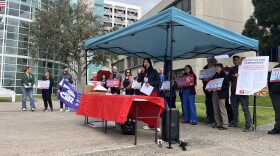Experts who’ve reviewed Chula Vista’s new privacy policy said it does not adequately protect personal data from police surveillance and contains loopholes that allow the information to be sold.
Chula Vista has been called one of the most surveilled cities in the nation. The Chula Vista City Council recently approved the new policy in part due to resident outrage over the police department’s use of surveillance tools and revelations that it was sharing some personal data with federal immigration officials.
The department in recent years has leaned heavily into using drones and automated license plate readers. In 2021, it opened a “real-time operations center,” which integrates data collected by different surveillance tools with information like jail records to solve crimes.
Then, early this year, KPBS revealed that the city’s contract with Motorola Solutions Inc. gave the tech giant extensive access to data collected on residents through its surveillance networks.
Chula Vista resident Pedro Rios was part of a working group established by the city to address privacy protection. The group met 10 times, took two tours of city technology and held two community gatherings. Yet, despite the work, Rios said he’s disappointed with the final policy.
“For me, it’s unclear exactly what the policy does,” he said.
City officials did not make themselves available for interviews regarding the policy. Meanwhile, privacy advocates said they know what the policy doesn’t do — it doesn’t prevent the sale of Chula Vista residents’ personal information.
“This policy has a lot of details but it also has a lot of loopholes and from my reading, those exceptions swallowed the rule,“ said Albert Fox Cahn, executive director of the nonprofit, New York-based Surveillance Technology Oversight Project.
Cahn said the exceptions in the policy include any information recorded in a place where people don’t have a reasonable expectation of privacy. That means any details captured in public places wouldn’t be covered, no matter how sensitive, he said.
“Whether it's your geolocation data, your biometric data, information about your phone number, your email address, much of the information that's covered by this policy is then simply exempted under that exception because a lot of the surveillance that is shared with vendors is recorded in public,” Cahn said.
Even worse, Cahn said the policy exempts information gathered from surveillance that’s part of an active criminal investigation.
“When you drive your car through the city, the automated license plate reader can track it,” Cahn said. “When you're sitting in your backyard, a drone could surveil you. When you're out (and) about almost anywhere in public, you could be captured by the real time command center.”
Law needed
Brian Hofer, executive director of the Oakland-based group Secure Justice, said the city’s new policy also does little to stop Chula Vista from entering into another contract, similar to the pact inked with Motorola. This allowed the company to profit from data run through the real time operations center.
“It does not expressly prohibit the selling,” Hofer said. “It sort of seems to imply that potential restrictions might be incorporated into future use policies.”
It's also important to note that the Chula Vista City Council opted for a policy on privacy rights instead of a law, Hofer said. Rios and other members of the resident working group specifically asked for a law.
Hofer has helped cities, including San Diego, Oakland and San Francisco, draft privacy rights ordinances.
“Everyone I’ve worked with has done an ordinance,” Hofer said. “And at this point, it’s probably getting close to three dozen. It’s not new. It’s not radical. The model has been around for six or seven years now.”
He said Chula Vista’s refusal to follow that model is telling.
“The leadership of Chula Vista never had any desire to really take this seriously,” Hofer said. “If they really wanted to be accountable to the public and say, 'we think these things are truly important,' then they would give it the weight of law and they would hold themselves accountable.”
Chula Vista City Council members said at a public meeting last month that a new law would be premature.
-
A local biologist's own experience gives him a deep understanding of the science and culture of deafness. In other news, the city of San Diego's ambulance provider, Falck, is offering sign-on bonuses as it faces staffing shortages ahead of an expected busy season for hospitals.
-
The San Diego Unified School District has been hit by a cybersecurity threat. Also, city officials face a dilemma on how city towing policies should handle people living in vehicles.










